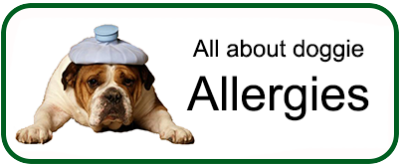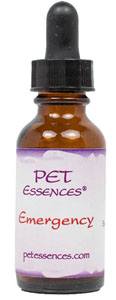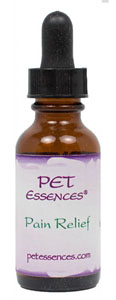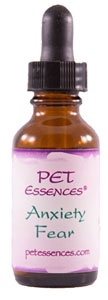Do you think your dog could be suffering from asthma?
Triggers for setting off asthmatic symptoms |
Dog Asthma Symptoms
What is Cyanosis? |
Diagnosis of dog asthma symptoms |
Treating dog asthma symptoms |
Oxygen |
Steroids |
Antihistamines |
Broncho-dilators
Dog asthma masks |
Dog asthma and natural remedies
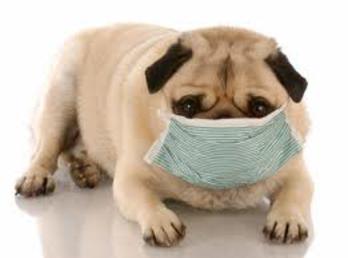
An asthmatic dog is a rarity, but dog asthma does occur in some dogs and particularly so in the case of breeds with a genetic disposition, as in the case of Maltese.
Dog asthma, also known as allergic bronchitis, is an allergic reaction in which the upper airway passages fill with mucous and go into spasm, making it hard for dogs to breathe (dyspnea).
Canine asthma is almost always caused by an irritant/s in the environment, collectively known as allergens.
Allergens are best described as any substance capable of producing immediate allergic reactions or asthmatic symptoms.
Triggers for setting off asthmatic symptoms

- Pollution.
- Stress.
- Tobacco smoke.
- Dust.
- Cold air.
- Sensitivity to certain foods, as well as food additives as in preservatives and artificial colourings.
Please see our article on Causes of Allergies.
Dog Asthma Symptoms
Generally speaking, a dog with asthma is asymptomatic (without dog asthma symptoms) until an actual asthma attack occurs.
When a dog asthma attack happens the dog’s primary asthmatic symptoms will be:
- A dry, hacking cough accompanied with breathing difficulties.
- Wheezing sounds and unable to “catch its breath” - almost as though it is gasping for air.
Other contributing asthmatic symptoms are virtually the same as those experienced by humans who have an asthmatic attack, including:
- Wheezing sounds.
- Laboured and shallow breathing.
- Open mouthed breathing.
- Spasmodic tightening and or constriction of the bronchial wall muscles.
- Flaring up of chronic (long-lasting) inflammatory disease in the airways.
- Exercise intolerance.
- Panic, your dog may paw at his face in panic trying to get his breath.
- Apathetic and disinterest in food, because breathing becomes more difficult when dogs try to eat.
- Lack of oxygen, resulting in fatigue and a bluish ting to all mouth tissues, brought on by a condition called "cyanosis".
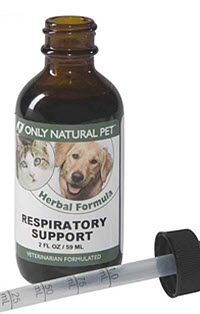
What is Cyanosis?
Cyanosis occurs when not enough oxygen reaches the lungs and the blood shows signs of reduced haemoglobin (iron containing cells). The condition is associated with purplish/bluish colouration of tissues where blood vessels are superficial as in the mouth to include, the tongue, gums and lips.
It is interesting to note that similar signs are exhibited with dogs that suffer from eczema.
Diagnosis of dog asthma symptoms
Checking for dog asthma symptoms and actually diagnosing asthmatic symptoms can be tricky for vets, because there are other diseases which have similar symptoms to dog asthma.
Giving a dog a complete physical examination and reviewing its previous medical history along with speaking in-depth with his owner is a good starting point.
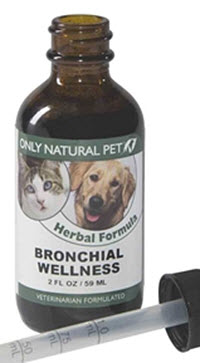
The vet will be looking for similarities in terms of visits and treatments given. For example, if it is noted that each year the dog has presented with dog asthma symptoms in early spring when pollen counts are high, then there is a high probability that the dog is suffering an allergic reaction to an allergen/irritant.
Ruling out other serious underlying conditions with similar symptoms to dog asthma is extremely important and vets commonly use blood tests and x-rays to achieve this.
Blood tests will detect the presence of:
- Parasites such as heart worms.
- Bacterial infections, e g. kennel cough.
X-rays will eliminate the possibilities of:
Treating dog asthma symptoms
The treatment for dog asthma symptoms depends on the cause. The main reason being, as the causes differ so do the treatments. For example, a dog which develops an asthma attack from allergens will almost certainly respond to taking antihistamines.
However antihistamines will not benefit a dog that has developed dog asthma symptoms through stress brought about by its owner’s lifestyle; in which case the owner will have to look closer to home for a remedy.
Some of the most common conventional treatments for dog asthma
Oxygen
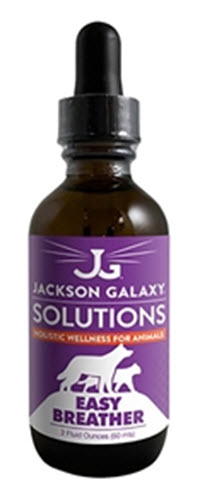
During an asthma attack a dog’s lungs become deprived of oxygen. As the attack progresses, it is not uncommon for dog’s to panic.
This leads to an increase in the dog’s heart rate which exacerbates the situation. At this point, as with humans, oxygen treatment is vital.
Steroids
Steroids are often used to reduce inflammation in the lungs, which if not treated can lead to breathing problems like wheezing and coughing. Steroids do have some side effects however your vet is the best person to advise pet owners on this point.
Antihistamines
Antihistamines control the allergic component of dog asthma and are prescribed to dry up excess fluid in the lungs and bronchi.
Broncho-dilators
Broncho-dilators are inhalants which are used to open up a dog’s airways during an asthma attack. If your dog needs to use inhalant medications, your vet will teach you how to administer them.
The usual procedure it to place a face mask over your dog’s mouth and nose which is connected to a short tube called a spacer. You will need to squeeze a short puff of medication into the spacer for your dog to breathe in – the optimum time is about 7 to 10 seconds.
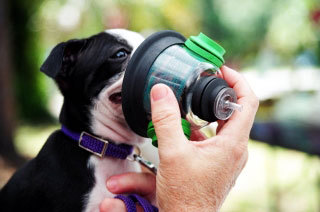
Dog asthma masks
Your veterinarian may not get the medication exactly right the first time around.
Each dog is different and it may well be a case of patience and experimentation for your veterinarian to determine the correct drug or combination of drugs for your dog's asthma.
Dog asthma and natural remedies
Herbal and homeopathic asthma treatment can be extremely effective in treating dog asthma. Depending on the severity of the asthmatic symptoms, they can reduce or even eliminate the need for synthetic drugs.
Some vets will use natural remedies to compliment conventional treatments, others won’t. If yours won't, and you feel strongly about this point, find yourself a vet who will.
This article and information forms part of the Carole's Doggie World Holistic Library and is presented for informational purposes only.The information is not intended to be a substitute for visits to your local vet. Instead, the content offers the reader information researched and written by Carole Curtis for www.carolesdoggieworld.com

